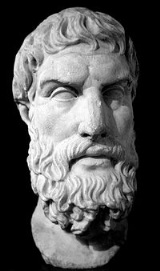
and the founder of the school of philosophy called Epicureanism
.
Only a few fragments and letters remain of Epicurus's 300 written works. Much of what is known about Epicurean philosophy derives from later followers and commentators.
For Epicurus, the purpose of philosophy was to attain the happy, tranquil life, characterized by ataraxia
—peace and freedom from fear—and aponia
—the absence of pain—and by living a self-sufficient life surrounded by friends.
He taught that pleasure and pain are the measures of what is good and evil, that death is the end of the body and the soul and should therefore not be feared, that the gods do not reward or punish humans, that the universe is infinite and eternal, and that events in the world are ultimately based on the motions and interactions of atoms
moving in empty space.
His parents, Neocles and Chaerestrate, both Athenian-born, and his father a citizen, had emigrated to the Athenian settlement on the Aegean
island of Samos
about ten years before Epicurus's birth in February 341 BCE.
Luxurious food and drinks, in no way protect you from harm. Wealth beyond what is natural, is no more use than an overflowing container. Real value is not generated by theaters, and baths, perfumes or ointments, but by philosophy.![]()
Don't fear god,Don't worry about death;What is good is easy to get, andWhat is terrible is easy to endure.![]()
It is impossible to live a pleasant life without living wisely and honorably and justly, and it is impossible to live wisely and honorably and justly without living pleasantly. Whenever any one of these is lacking, when, for instance, the man is not able to live wisely, though he lives honorably and justly, it is impossible for him to live a pleasant life. (5)
![]()
No pleasure is in itself evil, but the things which produce certain pleasures entail annoyances many times greater than the pleasures themselves. (8)![]()
The wealth required by nature is limited and is easy to procure; but the wealth required by vain ideals extends to infinity. (15)
![]()
Chance seldom interferes with the wise man; his greatest and highest interests have been, are, and will be, directed by reason throughout his whole life. (16).
![]()

